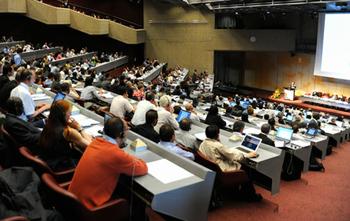Nations Plan to Undertake Global Climate Forecasting
GENEVA, Switzerland, September 1, 2009 (ENS) - A Global Framework for Climate Services that would provide climate forecasting the way that weather forecasting services do is in the works. This framework on advancing the science of climate prediction is intended to meet accelerating demands for useful information on the impacts of climate change.
The World Climate Conference-3 opened in Geneva Monday, bringing together some 2,000 climate and weather experts and politicians from around the world to identify the key components required for such a global climate forecasting service.
 |
Delegates at the World Climate Conference-3 (Photo courtesy Earth Negotiations Bulletin) |
"Extreme weather events and changing climatic conditions affect all of us, frequently resulting in humanitarian disasters and heavy losses," said Swiss President Hans-Rudolf Merz, who opened the conference on Monday.
"The objective of WCC-3 is to avoid such disasters, and to provide public authorities with the required tools – precipitation forecasts, hazard maps, early warning systems and long-term environmental prospects," said President Merz.
"These forecasts have to be translated for decision-makers in their respective sectors like food security, water management, health care and tourism," he said.
The task of establishing the Global Framework for Climate Services will be under consideration by government leaders, more than 80 ministers and delegations representing more than 150 countries, who will be attending the High-Level Segment September 3 and 4.
The climate forecasting system will require the participation of all countries, as well as the United Nations and many international partners.
"Until now, the way that we deliver climate information to some sectors has been ad hoc," said Michel Jarraud, secretary-general of the World Meteorological Organization, WMO. "What we need is a formal system that all people can trust to access vital information that can save their lives and protect property and economies."
 |
L-R: Kofi Annan, president, Global Humanitarian Forum, Michel Jarraud, secretary general, WMO, and Hans-Rudolph Merz, President of Switzerland (Photo courtesy ENB) |
The first two World Climate Conferences, in 1979 and 1990, enhanced capabilities to observe and assess climate change. They led to the establishment of the World Climate Research Program and the Global Climate Observing System, as well as the Nobel Peace Prize-winning Intergovernmental Panel on Climate Change and the United Nations Framework Convention on Climate Change.
The U.S. delegation to this week's World Climate Conference-3 is led by Dr. Jane Lubchenco, under secretary of commerce for oceans and atmosphere and administrator of the National Oceanic and Atmospheric Administration, NOAA.
"Climate change is real. It is happening now, in our backyards and around the globe," said Lubchenco. "Decision-makers across all sectors require reliable, relevant information about the current and projected impacts of climate change, whether they are farmers, manufacturers, or city officials planning snow removal budgets or options for water resources, transportation or new housing developments."
"In a rapidly changing world these decisions cannot be made based on weather of the past; decision-makers need to know what to expect in the next 20 to 50 years to plan effectively," said Lubchenco.
The U.S. delegation includes representatives from the White House Office of Science and Technology Policy, the White House Council on Environmental Quality, the Department of Commerce, Department of State, Department of the Interior, Department of Health and Human Services, the U.S. National Science Foundation, USAID, the Environmental Protection Agency, the National Aeronautics and Space Administration, and NOAA.
"Rarely are we presented with such a clear chance to shape our future, to start taking actions essential to making our planet healthier, safer and more environmentally and economically viable," said Lubchenco.
Dr. Gro Harlem Brundtland, the UN secretary-general's special envoy on climate change, and former prime minister of Norway, coined the phrase "sustainable development" in a 1987 report, "Our Common Future." Since then, she has been working towards a healthy and sustainable planet.
 |
Climate poster at the WCC-3 (Photo courtesy ENB) |
"We are faced with an enormous, yet imperative, task," said Brundtland, "to lay the groundwork for all countries, all sectors, all people impacted by climate variability and change to take decisive actions to adapt to the changing landscape."
"We can not only rely on individual projects or individual agencies to undertake this task," Brundtland said. "The international community needs to unite to make science-based information on climate available to all."
Speaking at the opening ceremony, Alexander Bedritsky, president of the World Meteorological Organization said that from the conference will emerge a picture of the state of observations, research and assessments at both the national and regional scales.
Bedritsky said, "The presentations by climate scientists and service providers, as well as experts in food, water, energy, disaster risk reduction, tourism, transport, the environment, will identify priority areas for developing climate services that address user needs."
Both Vladimir Tsirkunov of the World Bank and former UN Secretary-General Kofi Annan, who now serves as president of the Global Humanitarian Forum, emphasized that those most affected by adverse climate events are often not able to receive climate information.
"For climate science is not an academic exercise but of life changing – indeed life-saving - importance to hundreds of millions of people," said Annan. "The focus must be relentlessly on how to help those at the front-line of climate change."
"One result of this approach already has been the Weather Info for All project," said Annan.
"It is an imaginative initiative between the Global Humanitarian Forum, WMO and private sector to establish a network of automated weather stations across Africa through mobile phone technology," Annan told the delegates. "This will allow, again through mobile phones, the sharing of data with communities on the seasonal weather patterns on which they depend and to alert them to storms which threaten crops, livestock and lives."
Copyright Environment News Service (ENS) 2009. All rights reserved.
To subscribe or visit go to: http://www.ens-newswire.com